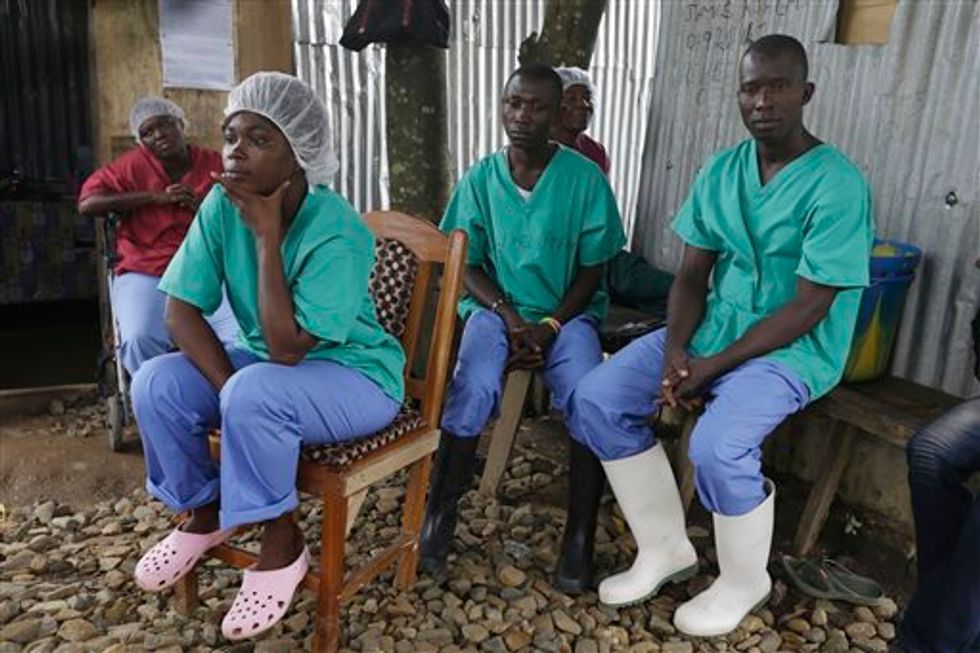LONDON (AP) -- Doctors have found that Ebola can linger in some male survivors for up to nine months but aren't sure if that means they might still be infectious, according to new research.
In a study of 93 men in Sierra Leone, scientists found the Ebola virus in semen samples from about half of them. The risk seemed to decline over time. Ebola was detected in all nine men tested at two to three months after their illness began but in only 11 of the 43 survivors tested at seven to nine months.
 Lingering health problems afflicting many of the roughly 13,000 Ebola survivors have galvanized global and local health officials seeking to determine how widespread the ailments are, and how to remedy them, with the World Health Organization calling it an emergency within an emergency. (AP/Sunday Alamba)
Lingering health problems afflicting many of the roughly 13,000 Ebola survivors have galvanized global and local health officials seeking to determine how widespread the ailments are, and how to remedy them, with the World Health Organization calling it an emergency within an emergency. (AP/Sunday Alamba)
Researchers aren't sure why Ebola remains in semen as opposed to other bodily fluids and don't know if the lingering virus might sicken others.
"We think there is a potential risk of exposure but we cannot determine that with 100 percent certainty right now," said Dr. Nathalie Broutet, an expert in sexually transmitted diseases at the World Health Organization and one of the study's authors. The paper was published online Wednesday in the New England Journal of Medicine.
WHO said previous studies showed the virus could survive in semen for about three months, though it noted one case where it remained for about six months. The U.N. health agency has said the sexual transmission of Ebola from men to women is "a strong possibility" even though the disease is mainly spread by direct contact with other bodily fluids like blood.
To date, Ebola has killed more than 11,000 people in West Africa in the outbreak that was first identified last year and now appears to be winding down. There's also about 17,000 Ebola survivors, about half of them male.
The journal also published details of an Ebola case in March in Liberia, where a male survivor spread Ebola to a woman via unprotected sex five months after he became infected.
In an accompanying commentary, Dr. Armand Sprecher of Doctors Without Borders said if sexual transmission of Ebola was a significant means of spreading the virus, "we would have seen a number of cases by now," given the thousands of male Ebola survivors in West Africa. People with Ebola are believed to be most infectious when they are the sickest.
Sprecher said the results suggest that surveillance needs to last longer than now recommended once an outbreak is thought to be over in an area.
WHO and others recommend that male survivors of the lethal disease abstain from sex or use condoms for at least three months after their recovery. After that, they should be tested every month until they have two consecutive negative tests.
 In this Monday, Aug. 10, 2015 photo, health workers take a break at the Kenema Government Hospital, where more than 40 health workers died of Ebola, in Kenema, eastern Sierra Leone. An Associated Press investigation has found a toxic mix of avoidable problems faced by Ebola responders, including weak leadership, shoddy supplies and infighting, exacerbated a chaotic situation at a critical front in the battle against the virus. (AP/Sunday Alamba)
In this Monday, Aug. 10, 2015 photo, health workers take a break at the Kenema Government Hospital, where more than 40 health workers died of Ebola, in Kenema, eastern Sierra Leone. An Associated Press investigation has found a toxic mix of avoidable problems faced by Ebola responders, including weak leadership, shoddy supplies and infighting, exacerbated a chaotic situation at a critical front in the battle against the virus. (AP/Sunday Alamba)
WHO says it's unknown how long Ebola survives in vaginal fluid, and says it's less probable that a woman who has survived Ebola could spread it to a man through sex.
Broutet said it was unclear whether the men whose samples tested positive for Ebola had any long-term side effects and if so, whether the virus might be responsible. Many survivors suffer from chronic problems including vision loss and joint pain.
Dr. Francis Moses, a district medical officer in northern Sierra Leone, said it was difficult convincing male Ebola survivors to use condoms or abstain from sex.
"The abstinence thing isn't working," he said, noting there are a number of pregnant women in his district whose partners are Ebola survivors.
Moses said the fact that thousands of Ebola survivors are living in West Africa means scientists need to figure out whether sex is a significant risk to the re-emergence of the disease.
"If we don't find a way of addressing this, we will never stop Ebola," he said.





